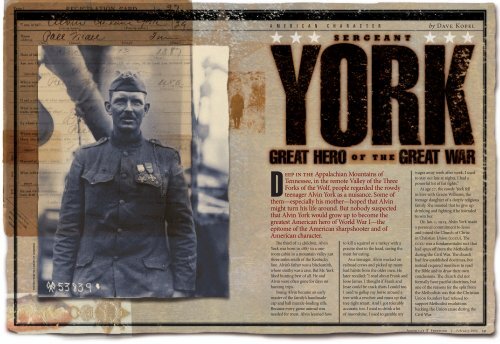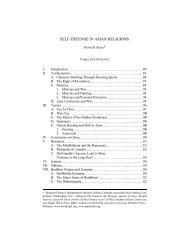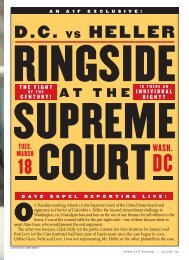Sergeant York: Great Hero of the Great War - Dave Kopel
Sergeant York: Great Hero of the Great War - Dave Kopel
Sergeant York: Great Hero of the Great War - Dave Kopel
Create successful ePaper yourself
Turn your PDF publications into a flip-book with our unique Google optimized e-Paper software.
PHOTOS FROM THE LIBRARY OF CONGRESS<br />
A M E R I C A N C H A R A C T E R<br />
Deep in <strong>the</strong> Appalachian Mountains <strong>of</strong><br />
Tennessee, in <strong>the</strong> remote Valley <strong>of</strong> <strong>the</strong> Th ree<br />
Forks <strong>of</strong> <strong>the</strong> Wolf, people regarded <strong>the</strong> rowdy<br />
teenager Alvin <strong>York</strong> as a nuisance. Some <strong>of</strong><br />
<strong>the</strong>m—especially his mo<strong>the</strong>r—hoped that Alvin<br />
might turn his life around. But nobody suspected<br />
that Alvin <strong>York</strong> would grow up to become <strong>the</strong><br />
greatest American hero <strong>of</strong> World <strong>War</strong> I—<strong>the</strong><br />
epitome <strong>of</strong> <strong>the</strong> American sharpshooter and <strong>of</strong><br />
American character.<br />
Th e third <strong>of</strong> 11 children, Alvin<br />
<strong>York</strong> was born in 1887 in a oneroom<br />
cabin in a mountain valley just<br />
three miles south <strong>of</strong> <strong>the</strong> Kentucky<br />
line. Alvin’s fa<strong>the</strong>r was a blacksmith,<br />
whose smithy was a cave. But Mr. <strong>York</strong><br />
liked hunting best <strong>of</strong> all. He and<br />
Alvin were <strong>of</strong>t en gone for days on<br />
hunting trips.<br />
Young Alvin became an early<br />
master <strong>of</strong> <strong>the</strong> family’s handmade<br />
cap and ball muzzle-loading rifl e.<br />
Because every game animal was<br />
needed for meat, Alvin learned how<br />
to kill a squirrel or a turkey with a<br />
precise shot to <strong>the</strong> head, saving <strong>the</strong><br />
meat for eating.<br />
As a teenager, Alvin worked on<br />
railroad crews and picked up many<br />
bad habits from <strong>the</strong> older men. He<br />
later recalled: “I read about Frank and<br />
Jesse James. I thought if Frank and<br />
Jesse could be crack shots I could too.<br />
I used to gallop my horse around a<br />
tree with a revolver and muss up that<br />
tree right smart. And I got tolerably<br />
accurate, too. I used to drink a lot<br />
<strong>of</strong> moonshine. I used to gamble my<br />
by <strong>Dave</strong> <strong>Kopel</strong><br />
wages away week aft er week. I used<br />
to stay out late at nights. I had a<br />
powerful lot <strong>of</strong> fi st fi ghts.”<br />
At age 27, <strong>the</strong> rowdy <strong>York</strong> fell<br />
in love with Gracie Williams, <strong>the</strong><br />
teenage daughter <strong>of</strong> a deeply religious<br />
family. She insisted that he give up<br />
drinking and fi ghting if he intended<br />
to win her.<br />
On Jan. 1, 1915, Alvin <strong>York</strong> made<br />
a personal commitment to Jesus<br />
and joined <strong>the</strong> Church <strong>of</strong> Christ<br />
in Christian Union (cccu). Th e<br />
cccu was a fundamentalist sect that<br />
had spun <strong>of</strong>f from <strong>the</strong> Methodists<br />
during <strong>the</strong> Civil <strong>War</strong>. Th e church<br />
had few established doctrines, but<br />
instead required members to read<br />
<strong>the</strong> Bible and to draw <strong>the</strong>ir own<br />
conclusions. Th e church did not<br />
formally have pacifi st doctrines, but<br />
one <strong>of</strong> <strong>the</strong> reasons for <strong>the</strong> split from<br />
<strong>the</strong> Methodists was that <strong>the</strong> Christian<br />
Union founders had refused to<br />
support Methodist resolutions<br />
backing <strong>the</strong> Union cause during <strong>the</strong><br />
Civil <strong>War</strong>.<br />
America’s 1 st<br />
Freedom | February 2006 39
A M E R I C A N C H A R A C T E R<br />
By <strong>the</strong> time that Alvin <strong>York</strong><br />
received his draft notice in June<br />
1917, he had read that <strong>the</strong> Bible<br />
said, “Th ou shalt not kill,” and had<br />
concluded—as had many o<strong>the</strong>r<br />
members <strong>of</strong> his church—that warfi<br />
ghting was wrong. Yet because <strong>York</strong><br />
did not belong to a denomination<br />
with formal pacifi st beliefs, his<br />
request for conscientious objector<br />
status was denied. He was inducted<br />
in November 1917.<br />
<strong>York</strong> quietly went through basic<br />
training and <strong>the</strong>n in <strong>the</strong> spring <strong>of</strong><br />
1918 spoke to an <strong>of</strong>fi cer about his<br />
continuing objection to war. <strong>York</strong>’s<br />
sincerity was obvious and he was<br />
taken to see Major George Edward<br />
Buxton, <strong>the</strong> battalion commander.<br />
Buxton and <strong>York</strong> spent a long night<br />
discussing <strong>the</strong> Bible. Buxton pointed<br />
to Jesus’ instruction that <strong>the</strong> apostles<br />
should carry swords (Luke 22:36); to<br />
Jesus’ statement that earthly<br />
kingdoms, unlike Jesus’ spiritual<br />
kingdom, do fi ght (John 18:36); and<br />
to <strong>the</strong> obligation for Christians to<br />
give governments <strong>the</strong> “things that<br />
are Caesar’s.” Finally, Buxton read<br />
<strong>York</strong> Ezekiel 33:1-6, in which God<br />
told <strong>the</strong> prophet to tell <strong>the</strong> people to<br />
listen for <strong>the</strong> watchman’s trumpet,<br />
and to take warning when an armed<br />
invader comes.<br />
<strong>York</strong> was now unsure what to<br />
think, so Buxton gave <strong>York</strong> a 10-day<br />
pass to go home and mull things<br />
over. <strong>York</strong> was promised that if he<br />
still objected to war, he would be<br />
given a non-combat assignment.<br />
<strong>York</strong> returned home, carrying<br />
his suitcase as he walked <strong>the</strong> fi nal<br />
12 miles <strong>of</strong> <strong>the</strong> trip. At home, <strong>York</strong>’s<br />
pastor and congregation urged him<br />
to remain an objector, and so did his<br />
mo<strong>the</strong>r. He went into <strong>the</strong> mountains<br />
alone, where he spent two days and<br />
one night praying for guidance.<br />
<strong>York</strong> came down from <strong>the</strong><br />
mountain and explained to a fellow<br />
congregant, “If some feller was to<br />
come along and bust into your house<br />
and mistreat your wife and murder<br />
your children, you’d just stand for it?<br />
You wouldn’t fi ght?”<br />
In May 1918, <strong>York</strong>’s unit, <strong>the</strong> 82nd<br />
Infantry, shipped out to France. <strong>York</strong><br />
was convinced “we were to be peacemakers…<br />
Th at was we-uns. We were<br />
to help make peace, <strong>the</strong> only way <strong>the</strong><br />
Germans would understand.”<br />
On Oct. 2, 1918, during <strong>the</strong><br />
Almost single-handedly, <strong>York</strong>—<br />
with his one rifl e and one<br />
pistol—had killed 25 Germans<br />
and knocked 35 German<br />
machine guns out <strong>of</strong> action.<br />
Battle <strong>of</strong> Meuse River-Argonne<br />
Forest, <strong>the</strong> fi rst battalion <strong>of</strong> <strong>the</strong> 308th<br />
Infantry Regiment was surrounded<br />
by Germans and isolated from <strong>the</strong><br />
rest <strong>of</strong> <strong>the</strong> American army. <strong>York</strong>’s<br />
division was sent to rescue <strong>the</strong> “Lost<br />
Battalion.”<br />
Leading a patrol on <strong>the</strong> morning<br />
<strong>of</strong> Oct. 8, <strong>York</strong> and his men<br />
surrounded a German camp, which<br />
surrendered aft er <strong>York</strong> killed one<br />
man. As <strong>the</strong> Americans were lining<br />
up <strong>the</strong> prisoners, German machinegunners<br />
opened fi re from <strong>the</strong> nearby<br />
hills. Nine Americans were instantly<br />
killed or wounded.<br />
<strong>York</strong> recalled: “I didn’t have time<br />
to dodge behind a tree or dive into<br />
<strong>the</strong> brush, I didn’t even have time to<br />
kneel or lie down … As soon as <strong>the</strong><br />
machine guns opened fi re on me, I<br />
began to exchange shots with <strong>the</strong>m.”<br />
<strong>York</strong> began picking <strong>of</strong>f <strong>the</strong><br />
German machine-gunners with his<br />
Enfi eld rifl e. “In order to sight me<br />
or to swing <strong>the</strong>ir machine guns on<br />
me, <strong>the</strong> Germans had to show <strong>the</strong>ir<br />
heads above <strong>the</strong> trench, and every<br />
time I saw a head I just touched it <strong>of</strong>f .<br />
All <strong>the</strong> time I kept yelling at <strong>the</strong>m to<br />
come down. I didn’t want to kill any<br />
more than I had to. But it was <strong>the</strong>y<br />
or I, and I was giving <strong>the</strong>m <strong>the</strong> best<br />
I had.”<br />
When one <strong>of</strong> <strong>York</strong>’s fi ve-round<br />
ammunition clips ran out, <strong>the</strong><br />
Germans commenced a bayonet<br />
charge, fi guring that at least one <strong>of</strong><br />
<strong>the</strong> Germans could get to <strong>York</strong> before<br />
he could reload.<br />
<strong>York</strong> raised his Colt .45 pistol,<br />
and “…just touched <strong>the</strong>m <strong>of</strong>f , too. I<br />
touched <strong>of</strong>f <strong>the</strong> sixth man fi rst, <strong>the</strong>n<br />
<strong>the</strong> fi ft h, <strong>the</strong>n <strong>the</strong> fourth, <strong>the</strong>n <strong>the</strong><br />
third, and so on. I wanted <strong>the</strong>m to<br />
keep coming. I didn’t want <strong>the</strong> rear<br />
ones to see me touching <strong>of</strong>f <strong>the</strong> front<br />
ones. I was afraid <strong>the</strong>y would drop<br />
down and pump a volley into me.”<br />
Finally, <strong>the</strong> German commander<br />
complied with <strong>York</strong>’s surrender order.<br />
Corporal Alvin <strong>York</strong> and <strong>the</strong> seven<br />
remaining able-bodied Americans<br />
faced <strong>the</strong> task <strong>of</strong> controlling several<br />
dozen German prisoners and getting<br />
<strong>the</strong>m through German territory and<br />
back to <strong>the</strong> American lines. On <strong>the</strong><br />
march back, <strong>York</strong>’s group ran into two<br />
o<strong>the</strong>r groups <strong>of</strong> Germans and bluff ed<br />
<strong>the</strong>m into surrendering, too.<br />
Returning to American lines, <strong>York</strong><br />
brought in 128 German enlisted<br />
men and four <strong>of</strong>fi cers. Almost<br />
single-handedly, <strong>York</strong>—with his one<br />
rifl e and one pistol—had killed 25<br />
Germans and knocked 35 German<br />
machine guns out <strong>of</strong> action. Th e<br />
French army commander Marshal<br />
Foch called <strong>York</strong>’s feat “<strong>the</strong> greatest<br />
thing accomplished by any private<br />
soldier in all <strong>the</strong> armies in Europe.”<br />
Perhaps <strong>the</strong> Germans could have<br />
defeated <strong>York</strong>, but <strong>the</strong>ir morale was<br />
low, while <strong>York</strong>’s was as high as could<br />
YORK ON SHOOTING<br />
From Alvin <strong>York</strong>’s Diary<br />
In our shooting matches at<br />
home we shot at a turkey’s<br />
head. We tied <strong>the</strong> turkey<br />
behind a log, and every time<br />
it bobbed up its head we<br />
let fl y with those old muzzleloaders<br />
<strong>of</strong> ours. We paid 10 cents a shot,<br />
and if we hit <strong>the</strong> turkey’s head we<br />
got to keep <strong>the</strong> whole turkey. This<br />
way we learn to shoot from about<br />
60 yards. Or we would tie <strong>the</strong> turkey<br />
out in <strong>the</strong> open at 150 yards, and if<br />
you hit it above <strong>the</strong> knee or below<br />
<strong>the</strong> gills you got it. I think we had<br />
just about <strong>the</strong> best shots that ever<br />
squinted down a barrel. Daniel<br />
Boone and Davy Crockett used to<br />
shoot at <strong>the</strong>se matches long ago.<br />
And Andrew Jackson used to recruit<br />
his Tennessee sharpshooters from<br />
among our mountain shooters.<br />
We used to call our most famous<br />
matches “beeves.” We would make<br />
up a beef, that is, we would drive<br />
up a beef and <strong>the</strong>n each pay, say a<br />
dollar until we had made up <strong>the</strong> value<br />
<strong>of</strong> <strong>the</strong> beast. The owner got this<br />
money. And we were each allowed<br />
so many shots. The best shot got<br />
<strong>the</strong> choice <strong>of</strong> <strong>the</strong> hind quarters, <strong>the</strong><br />
second best <strong>the</strong> o<strong>the</strong>r hind quarter,<br />
<strong>the</strong> third <strong>the</strong> choice <strong>of</strong> <strong>the</strong> fore<br />
quarters, <strong>the</strong> fourth <strong>the</strong> o<strong>the</strong>r fore<br />
quarters, and <strong>the</strong> fi fth <strong>the</strong> hide<br />
and tallow.<br />
Our matches were held in an<br />
opening in <strong>the</strong> forest, and <strong>the</strong><br />
shooters would come in from all over<br />
<strong>the</strong> mountains, and <strong>the</strong>re would be<br />
a great time. We would shoot at a<br />
mark crisscrossed on a tree. The<br />
distance was 26 yards <strong>of</strong>f-hand or<br />
40 yards prone with a rest. You had<br />
to hit that cross if you ever hoped<br />
to get all <strong>of</strong> that meat. Some <strong>of</strong> our<br />
mountaineers were such wonderful<br />
shots that <strong>the</strong>y would win all fi ve<br />
prizes and drive <strong>the</strong> beef home alive<br />
on <strong>the</strong> ho<strong>of</strong>. Shooting at squirrels is<br />
good, but busting a turkey at 150<br />
yards—ho ho. So <strong>the</strong> Army shooting<br />
was tolerably easy for me.<br />
be. He believed that God was with<br />
him. He later explained, “We know<br />
<strong>the</strong>re are miracles, don’t we? Well this<br />
was one. I was taken care <strong>of</strong>—it’s <strong>the</strong><br />
only way I can fi gure it.”<br />
When <strong>York</strong> later returned to<br />
<strong>the</strong> battle scene to give a tour to<br />
American General Julian Lindsey, <strong>the</strong><br />
general asked, “‘<strong>York</strong>, how did you<br />
do it?’ And I answered him, ‘Sir, it is<br />
not man power. A higher power than<br />
man power guided and watched over<br />
me and told me what to do.’ And <strong>the</strong><br />
general bowed his head and put his<br />
hand on my shoulder and solemnly<br />
said, ‘<strong>York</strong>, you are right.’”<br />
Before <strong>York</strong> returned to <strong>the</strong> United<br />
States in <strong>the</strong> spring <strong>of</strong> 1919, he had<br />
become one <strong>of</strong> <strong>the</strong> most famous men<br />
in America, thanks to a lead article<br />
in <strong>the</strong> Saturday Evening Post. (“Th e<br />
Second Elder Gives Battle,” April 26,<br />
1919, by George Patullo.)<br />
On May 22, New <strong>York</strong> City gave<br />
<strong>York</strong> a ticker-tape parade. At fi rst, he<br />
thought <strong>the</strong> confetti falling from <strong>the</strong><br />
skyscrapers was snow.<br />
“It was very nice,” he wrote in his<br />
diary. “But I sure wanted to get back<br />
to my people where I belonged, and<br />
<strong>the</strong> little old mo<strong>the</strong>r and <strong>the</strong> little<br />
mountain girl who were waiting.<br />
And I wanted to be in <strong>the</strong> mountains<br />
again and get out with hounds, and<br />
tree a coon or knock over a red fox.<br />
And in <strong>the</strong> midst <strong>of</strong> <strong>the</strong> crowds and<br />
<strong>the</strong> dinners and receptions I couldn’t<br />
help thinking <strong>of</strong> <strong>the</strong>se things.”<br />
When he fi nally got home, “I didn’t<br />
do any hunting for a few days. I’m<br />
telling you I went hunting Gracie fi rst.”<br />
Finally, “I got out with <strong>the</strong> hounds<br />
and <strong>the</strong> old muzzleloader; and I got<br />
to thinking and wondering what it<br />
was all about. And I went back to<br />
<strong>the</strong> place on <strong>the</strong> mountain where I<br />
prayed before <strong>the</strong> war and received<br />
my assurance from God that I would<br />
go and come back. And I just stayed<br />
out <strong>the</strong>re and thanked that same God<br />
who had taken me through <strong>the</strong> war.”<br />
Alvin <strong>York</strong> received <strong>the</strong> Medal <strong>of</strong><br />
Honor and <strong>the</strong> Distinguished Service<br />
Cross, as well as medals from France,<br />
Italy and Montenegro. He was also<br />
promoted from Corporal to <strong>Sergeant</strong>.<br />
<strong>Sergeant</strong> <strong>York</strong> absolutely refused<br />
to make money from his fame. But<br />
as <strong>the</strong> Second World <strong>War</strong> began to<br />
threaten <strong>the</strong> United States, he fi nally<br />
consented to <strong>the</strong> production <strong>of</strong> a<br />
biographical movie.<br />
In <strong>the</strong> rapidly modernizing and<br />
urbanizing America <strong>of</strong> <strong>the</strong> early<br />
1920s, Americans had looked to<br />
<strong>Sergeant</strong> <strong>York</strong> as a reminder <strong>of</strong><br />
<strong>the</strong>ir traditional rural virtues and<br />
simplicity. In 1941, with global war<br />
approaching, Americans looked to<br />
<strong>the</strong> movie “<strong>Sergeant</strong> <strong>York</strong>” to martial<br />
courage in <strong>the</strong> face <strong>of</strong> danger.<br />
Alvin <strong>York</strong> had insisted that <strong>the</strong><br />
movie’s lead role be given to Gary<br />
Cooper. It was an astute choice,<br />
as Cooper’s performance won <strong>the</strong><br />
Academy Award for Best Actor.<br />
People who knew <strong>Sergeant</strong> <strong>York</strong>’s<br />
real-life story were surprised, though,<br />
that <strong>the</strong> movie showed <strong>York</strong> using a<br />
Luger pistol ra<strong>the</strong>r than a Colt; <strong>the</strong><br />
producers could not fi gure out how<br />
to make a Colt fi re blanks.<br />
When <strong>Sergeant</strong> Alvin <strong>York</strong> passed<br />
away in 1964, President Johnson told<br />
<strong>the</strong> nation, “As <strong>the</strong> citizen-soldier<br />
hero <strong>of</strong> <strong>the</strong> American Expeditionary<br />
Forces, he epitomized <strong>the</strong> gallantry<br />
<strong>of</strong> American fi ghting men and <strong>the</strong>ir<br />
sacrifi ces in behalf <strong>of</strong> freedom.”<br />
Two years later, President Johnson<br />
again recalled <strong>Sergeant</strong> <strong>York</strong>: “… <strong>the</strong><br />
majority <strong>of</strong> our countrymen still<br />
agree with <strong>the</strong> words that a great<br />
American hero spoke a long time<br />
ago. It was <strong>Sergeant</strong> Alvin <strong>York</strong> who<br />
once said, ‘Liberty and freedom and<br />
democracy are so very precious that<br />
you do not fi ght to win <strong>the</strong>m once<br />
and <strong>the</strong>n stop. You do not do that.<br />
Liberty and freedom and democracy<br />
are prizes that are awarded only to<br />
those people who fi ght to win <strong>the</strong>m<br />
and <strong>the</strong>n keep on fi ghting eternally to<br />
hold <strong>the</strong>m.’”<br />
America’s 1 st<br />
Freedom | February 2006 41




